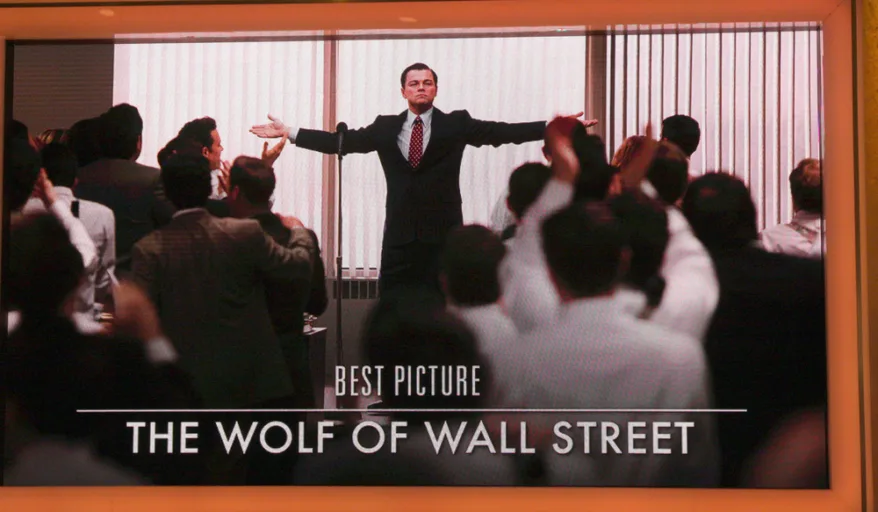A true classic. One of the most rewatched movies about money. Always at the top 10 of any good list. Let’s get started.
What you'll learn:
⓵ A brief overview of the plot
The film tells the true story of Jordan Belfort, a stockbroker who becomes involved in securities fraud and money laundering through his firm Stratton Oakmont. The film begins with Jordan Belfort as a young and ambitious stockbroker, eager to make a name for himself on Wall Street (and who can blame him?).

However, he soon finds himself in the midst of a corrupt and illegal world of penny stocks and pump-and-dump schemes. With the help of his closest associates, Jordan and his firm Stratton Oakmont engage in unethical and illegal practices to defraud investors and make a fortune (cha-ching).
Throughout the movie, Jordan and his colleagues use drugs, engage in illegal activities, and live a lavish lifestyle. But eventually, the FBI investigates the firm. And Jordan and his associates are arrested and charged with securities fraud. The movie depicts the rise and fall of Jordan Belfort and shows the negative consequences of greed and corruption in the world of finance.
⓶ A highlight of the main actors
Leonardo DiCaprio (as Jordan Belfort) puts on a great performance under the direction of Martin Scorsese (what a legend!). DiCaprio gives a powerful and nuanced portrayal of Jordan Belfort. He manages to capture so well the character’s charisma and also his descent into immoral and illegal behavior. He also does a great job of bringing the character to life and making the audience understand his motives even if the deeds are not that good.
Martin Scorsese’s direction and cinematography are also noteworthy. Scorsese created a visually stunning film that brings the audience into the world of Wall Street. From the luxurious lifestyle to the gritty details of the investigation.
He was able to create a perfect balance between the excess and the grit that immerses the audience in the story. The audience feels like they are really part of the film. And this goes to show his skills as a filmmaker.

⓷ A detailed account of the themes explored
The Wolf of Wall Street explores several themes that are relevant to the world of finance and the human experience. One of the main themes of the film is the negative consequences of greed and corruption.
The movie depicts how the characters (led by Jordan Belfort) were willing to engage in illegal and unethical activities in order to make a fortune. And how these actions ultimately led to their downfall.
Another theme of the film is the dangers of putting profit above all else. The movie serves as a reminder that when individuals (or organizations) prioritize profit over all else, they can lose sight of what is truly important. And the negative consequences that can result from this mentality.
The glamorization of wealth and power is another theme explored in the movie. Also, the film doesn’t shy away from showing the characters’ excessive lifestyles and luxuries. But it also provides a reminder that these trappings of wealth often come at a great cost to others.
Additionally, the film highlights the importance of ethical behavior and integrity in any business. By showing the negative consequences that come from breaking the law, and losing the moral compass.
⓸ The critical reception of the film
The Wolf of Wall Street was well-received by critics (and everyone else) upon its release. And it was nominated for several awards, including five Academy Awards. The film was widely praised for its performances, particularly Leonardo DiCaprio’s portrayal of Jordan Belfort and Martin Scorsese’s direction.
The movie has an 8.2 out of 10 on IMDb and an 89% on Rotten Tomatoes, This score is the result of both professional critics’ and viewers’ ratings. And it demonstrates the wide appeal of the film.
The Wolf of Wall Street is considered a cult classic by many with high rewatchability value. This is due to its fast-paced, energetic, and often hilarious script. The film also has a cool soundtrack that adds another level of entertainment to the overall experience.
All in all, The Wolf of Wall Street was critically acclaimed for its performances, direction, and its ability to entertain. And it has become a classic film in the genre of movies about money and corruption.
⓹ A warning to the audience
The Wolf of Wall Street is a film that portrays illegal and disturbing activities. It contains scenes of drug use, graphic sex, and other content that might be disturbing for some viewers. It’s important to keep in mind that these activities are not condoned or glorified in the film. But rather are portrayed as a reflection of the characters’ descent into corruption and immorality.
The film also shows the characters’ excessive lifestyles and luxuries, such as fancy cars, private jets, and yachts. But it’s important to keep in mind that these aren’t real and they often come at a great cost to others. The movie serves as a reminder that in the real world, the things that we see as desirable, can often be the result of illegal activities. And that those activities have real-world consequences.
It’s important to approach the film with an open mind (as always). And be aware of the themes and messages that it’s trying to convey. And that the movie is a fictionalized version of real-life events and not to take it as a guide for real-world behavior.
⓺ The famous quote “Sell me this pen”
The quote “Sell me this pen” is a famous scene from the movie in which Jordan Belfort (played by Leonardo DiCaprio) challenges one of his colleagues to sell him a pen. This scene is a reflection of the importance of sales, persuasion, and influence in the world of finance and business.
And it’s a great example of how persuasive language and rhetorical devices can be used to sell a product. In this scene, Jordan Belfort is teaching his colleague how to use verbal cues, active listening, and mirroring techniques to close a sale.

The quote is also a reminder that a good salesperson is able to sell anything. Not just a physical product. But also an idea (or a vision) by tapping into the customer’s desires and emotions. It’s also a reminder that the art of persuasion and influence can be used for good or for bad and it’s important to use it ethically.
⓻ Food for thought
The Wolf of Wall Street is a thought-provoking film that raises important questions about ethics, morality, and the consequences of our actions. After watching the movie, you. may want to consider the following:
- Reflect on your own values and beliefs and consider how they align with those depicted in the film.
- Ask yourself if you are putting profit above all else in your own lives or careers and consider the potential negative consequences of this mindset.
- Consider the importance of integrity, ethics, and morality in any business or profession.
- Think about how you can use the power of persuasion and influence ethically and responsibly in your own lives and careers.
In order to internalize these lessons and make a real change, you could:
- Make a plan to be more aware of your own actions and the potential consequences that come from them.
- Research more about the laws and regulations that govern the industry or profession you are working on.
- Read books, articles, and research on the subject of ethics in business, negotiation, and persuasion.
- Seek out mentorship from people who have a good reputation for using their persuasion and negotiation skills ethically.
By considering these inner thoughts and questions, and taking action on them, you can gain a deeper understanding of the themes and messages of the film and make positive changes in your own lives and careers.
⓼ Top 5 lessons from “The Wolf of Wall Street”
❖ Greed and corruption can lead to immoral behavior and criminal activity
One real-life example of this is the Enron scandal, in which executives at the energy company engaged in accounting fraud and insider trading to inflate the company’s stock prices and deceive investors. As a result, the company’s collapse led to the loss of thousands of jobs and billions of dollars in retirement savings for employees.
❖ The pursuit of wealth and power can lead to a loss of one’s moral compass
Another example can be the case of Bernie Madoff, who ran a Ponzi scheme that defrauded investors of billions of dollars. Despite his good reputation and philanthropic activities, Madoff’s actions were driven by his own greed and desire for power and prestige.
❖ Illegal activities will always catch up with you eventually
Many financial fraudsters and insider traders have been caught and are serving their time. An example is Raj Rajaratnam. The former hedge fund manager who was convicted and sentenced to 11 years in prison for insider trading.
❖ The consequences of one’s actions can have a severe and long-lasting impact on both the individual and those around them
The example of the Enron scandal also demonstrates this. In addition to the loss of jobs and savings for employees, many executives at the company faced criminal charges and long prison sentences.
❖ The importance of honest, transparent, and fair practices in any business
In the wake of financial scandals like Enron, new regulations like the Sarbanes-Oxley Act (SOX) have been put in place to increase transparency and accountability in corporate governance. To ensure that such events do not happen again.
It’s worth noting that these examples are not only in finance. But in any industry. And the importance of integrity and transparency are crucial in any business.
⓽ Top 5 quotes and their meaning
“The only thing standing between you and your goal is the bullshit story you keep telling yourself as to why you can’t achieve it.”
— Jordan Belfort
Often, the only thing holding us back from achieving our goals is the limiting beliefs and excuses we tell ourselves. For instance, a person who wants to be a musician but tells himself that he’s not talented enough, has no opportunities, and so on.
“I’m not a delusional narcissist, I’m a delusional moron.”
— Jordan Belfort
This quote highlights the destructive nature of delusion and self-deception. It’s a self-deprecating statement of the main character. For example, a person who is convinced that he’s a great leader. But in reality, his employees don’t think highly of him.
“I’m not gonna say it’s a moral victory, but it’s a moral victory.”
— Donnie Azoff
The speaker is acknowledging that something they did may not be morally right. But they still view it as a victory. In this case, they are describing a situation where they outsmarted someone. For example, a company that knew they were breaking the rules but believe they succeeded in doing something unethical. From their perspective, it’s a win.
“I want you to deal with your problems by becoming rich!”
— Jordan Belfort
This quote suggests that wealth can solve many of life’s problems. It’s a message that is portrayed throughout the movie. But the main character is aware that it’s not true. One real-life example is the person who believes that if they win the lottery, all their problems will be solved. While it’s true that money can ease certain difficulties, it can’t solve all of life’s challenges.
“If you want to fly, you got to give up the shit that weighs you down.”
— Jordan Belfort
This quote suggests that in order to achieve something significant, you have to let go of things that hold you back. Be it bad habits, negative thoughts, or any other thing that hinders progress. One example is the person who wants to lose weight. To achieve these goals, they have to let go of unhealthy eating habits, and negative thoughts. And start a healthier lifestyle.

⓾ 7 important facts about Jordan Belford
- Jordan Belfort was a stockbroker and the founder of Stratton Oakmont, a firm that engaged in securities fraud and pump-and-dump schemes.
- Belfort’s illegal activities resulted in him being convicted of securities fraud and money laundering in 1999. He was sentenced to four years in prison and ordered to pay restitution to his victims.
- The Wolf of Wall Street, the 2013 film directed by Martin Scorsese and starring Leonardo DiCaprio, is based on Belfort’s memoir of the same name.
- Following his release from prison, Belfort became a motivational speaker and sales trainer. He also paid back $11.6 million of the $110.4 million he was ordered to pay in restitution to his victims.
- Belfort’s rise and fall is a cautionary tale about the dangers of greed, deception, and corruption in the world of high finance. He serves as a reminder of the importance of ethical behavior and integrity in the financial industry. And the consequences of breaking the law.
- Jordan Belfort is also known for using techniques and strategies of persuasion and manipulation to scam people. The screenplay of the movie is actually based on his own memoir, so some characters and events are fictionalized. But the overall theme and message are real.
- Additionally, he has written other books. One of them is called “The Straight Line Persuasion System” where he explains how to sell, persuade, and influence people using psychological techniques.
⑪ Top 5 FAQ
- Who directed the film “The Wolf of Wall Street”? Martin Scorsese.
- What is the film “The Wolf of Wall Street” based on? On the memoir of the same name by Jordan Belfort, a stockbroker who became involved in securities fraud and money laundering.
- Who stars in the film “The Wolf of Wall Street”? Leonardo DiCaprio stars as Jordan Belfort.
- What illegal activities is the main character Jordan Belfort involved in in the film “The Wolf of Wall Street”? Jordan Belfort is involved in securities fraud and money laundering through his firm Stratton Oakmont.
- What is the main message of the film? The main message of the film is the cautionary tale of the dangers of greed, deception, and corruption in the world of high finance. It’s a reminder of the importance of ethical behavior and integrity in the financial industry. And the consequences of breaking the law.
⑫ Positives and negatives
Here are 5 positive things about the movie:
- The performances of the main actors are top-notch, with Leonardo DiCaprio delivering a powerful and nuanced portrayal of Jordan Belfort.
- The film has a high level of technical proficiency, with Martin Scorsese’s direction and the cinematography being particularly noteworthy.
- The film’s screenplay is well-written and effectively captures the highs and lows of the characters’ experiences.
- The film is a satirical look at the excesses of the financial industry and the negative consequences that can result from greed and corruption.
- The film has a strong soundtrack that effectively adds to the atmosphere and pacing of the film
And here are 5 negative things:
- The film is very dark, with a lot of drug use and sex. This can make it disturbing for some viewers.
- The film has been criticized for glamorizing the illegal activities depicted in the film.
- It can be argued that the movie doesn’t have enough empathy for the victims of the main character’s actions.
- It’s a long movie (almost 3 hours). And it can be a test of patience for some viewers.
- Some viewers may find the characters’ behavior to be over the top, unbelievable, and difficult to relate to.
⑬ Important conclusions
- The movie highlights the glamorization of wealth and power, and how it can blind individuals to the negative consequences of their actions. The excessive lifestyles and luxuries portrayed in the film can be misleading. As they often come at a great cost to others.
- The movie shows how corporate culture can encourage and reward illegal activities. As Jordan and his colleagues engage in unethical behavior. And justify it as a necessary means to an end.
- The movie also depicts the role of drugs, alcohol, and other vices that can be used to cope with the stress and guilt of illegal activities. This is not a healthy way to handle these emotions and it leads to more problems.
- The movie also reflects on the impact of one’s actions on their loved ones and those around them. Jordan’s family and friends are affected by his illegal activities. And it’s clear how those actions have a ripple effect on those who are close to the person committing the wrongs.
- The film also serves as a reminder that the pursuit of wealth and power can lead to a loss of one’s moral compass. And that illegal activities will always catch up with you eventually. The consequences of one’s actions can have a severe and long-lasting impact on both the individual and those around them. And it’s never worth it.
- The Wolf of Wall Street is an entertaining movie. But should be understood in light of the real-world financial crime it depicts. It’s a cautionary tale that teaches us about the damage that greed and corruption can cause.
⑭ Score
The Wolf of Wall Street is widely considered to be one of the best movies about money and corruption in the world of finance. Its popularity and critical acclaim are evidence of this.
From a critical perspective, The Wolf of Wall Street has a rating of 8.2 out of 10 on IMDb and a rating of 89% on Rotten Tomatoes. It was also nominated for five Academy Awards, including Best Picture.
From a public perspective, the movie has gained a massive following since its release and it’s considered a cult classic by many. It’s a movie that has a high rewatchability value.
So overall, The Wolf of Wall Street ranks very high. I would say a 9/10. It’s worth noting that the ranking is very subjective. And based on personal taste. So this ranking may differ for you.
Final thoughts
In summary, The Wolf of Wall Street is an entertaining and thought-provoking film that raises important questions about ethics, and morality. And the consequences of our actions. And it’s a must-watch for those interested in the world of finance, corruption, and the art of persuasion.



